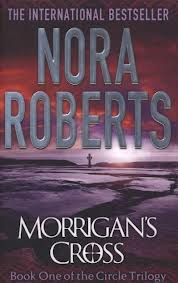Morrigan's Cross, by Nora Roberts
Sep 7
2006

As anyone who’s had the misfortune of hearing me speak recently knows, I’ve been sick. Really sick. I sound like a seal with a lifelong pack-a-day habit. The only upside to the past week and a half (which I’ve spent in bed, surrounded by medication, crumpled tissues, and thousands of tea mugs) is that it’s given me loads of time to read. I’ve worked my way through all of Heyer’s mysteries, the third Jonathan Stroud novel (thanks, Colin!), and the first book in Nora Roberts’s new trilogy, Morrigan’s Cross.
Unfortunately, I wasn’t overly impressed by it. That’s not to say that I won’t read the other two books in this series. I’ll buy them the second they come out—a new Roberts book is always worth the cost of a paperback edition, at least. But Morrigan’s Cross just wasn’t one of Roberts’s finer efforts. Clearly, she was intending to write a fairy tale, but while I’ve read and enjoyed her earlier supernatural stories, this one missed the mark.
Morrigan’s Cross begins in twelfth century Ireland, as a sorcerer named Hoyt is attempting to kill a vampire. (Hoyt’s beef with the vampire is that she has just killed and turned his brother, Cian.) The battle ends in a draw, but mystical forces intervene, and Hoyt is sent to modern-day New York, where he is re-united with the vampire version of his brother, along with a handful of new allies, and given a second chance at revenge.
My biggest problem with this book was that it was low on friendship and family scenes, which have always been Roberts’s greatest strengths. Even when her romances are forgettable (which is the case here), readers can usually count on Roberts to surround her characters with a loving, realistic, and very funny surrogate family. Those themes will be clearly be developed as the series progresses, but meanwhile we’re stuck with a bunch of glum, isolated people, all of whom have their own agendas.
Plus, this book required an incredible amount of disbelief-suspension. I did my best, but some things are tough to ignore. I mean—a hero from the twelfth century? Ever seen old armor? People were short back then—the dude would have been tiny! I’ll accept a 21st century witch falling in love with a 12th century sorcerer. I’ll accept vampires and demon hunters and people from Arthurian legends. (I’ll even accept that they all somehow speak the same language, although the thought gives me a headache.) But my brain balks at the idea of a man from 1128 topping six feet.
We all have to draw the line somewhere.
Unfortunately, I wasn’t overly impressed by it. That’s not to say that I won’t read the other two books in this series. I’ll buy them the second they come out—a new Roberts book is always worth the cost of a paperback edition, at least. But Morrigan’s Cross just wasn’t one of Roberts’s finer efforts. Clearly, she was intending to write a fairy tale, but while I’ve read and enjoyed her earlier supernatural stories, this one missed the mark.
Morrigan’s Cross begins in twelfth century Ireland, as a sorcerer named Hoyt is attempting to kill a vampire. (Hoyt’s beef with the vampire is that she has just killed and turned his brother, Cian.) The battle ends in a draw, but mystical forces intervene, and Hoyt is sent to modern-day New York, where he is re-united with the vampire version of his brother, along with a handful of new allies, and given a second chance at revenge.
My biggest problem with this book was that it was low on friendship and family scenes, which have always been Roberts’s greatest strengths. Even when her romances are forgettable (which is the case here), readers can usually count on Roberts to surround her characters with a loving, realistic, and very funny surrogate family. Those themes will be clearly be developed as the series progresses, but meanwhile we’re stuck with a bunch of glum, isolated people, all of whom have their own agendas.
Plus, this book required an incredible amount of disbelief-suspension. I did my best, but some things are tough to ignore. I mean—a hero from the twelfth century? Ever seen old armor? People were short back then—the dude would have been tiny! I’ll accept a 21st century witch falling in love with a 12th century sorcerer. I’ll accept vampires and demon hunters and people from Arthurian legends. (I’ll even accept that they all somehow speak the same language, although the thought gives me a headache.) But my brain balks at the idea of a man from 1128 topping six feet.
We all have to draw the line somewhere.
Posted by: Julia, Last edit by: Julianka
No new comments are allowed on this post.
Comments
robotic princess
I think the next two romances will be a lot better in this series--for one thing, we'll know the characters better. Roberts just tried to pack too much into this book. Caring about the characters would have required another hundred pages or so.